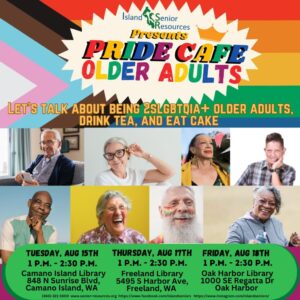LEADERSHIP CORNER
The Café Model: a new approach to community support.
by Katheryn Howell, ISR Senior Director of Community Programs
There is a movement afoot called the Café. Unlike support groups, Cafés are topical conversations open to the broader community. I talked with Mel Watson, who has led programs and support groups for ISR for a decade, about ISR’s online support groups and the introduction of Cafés at ISR.
Katheryn: You’ve led support programs for caregivers and receivers for almost a decade for ISR. How has or hasn’t the pandemic changed the needs of these groups?
Mel: Support group participation increased by 400% during the pandemic. We moved all our support groups from in-person to online. I saw the benefits right away. Meeting virtually allowed people to see each other’s faces and connect with their emotions. In a virtual room, it’s a much different vibe; people become more vulnerable as we have the comforts of home around us, and we don’t wear that outside mask. It takes a long time for someone to seek support, and when they can log in to participate in a group and see that there are people just like them, attendees seem to let go and trust that this group will be there for them. Participants prefer meeting virtually, and we offer hybrid for those who do not have a private space at home (needed for sensitivity to the care receiver). Over time I have watched attendees connect and become friends. Now post COVID, group participants are meeting outside of support groups.
Katheryn: The Café approach is new. Can you explain the difference between a support group and a Café?
Mel: Support groups focus on supporting someone facing challenges, while Cafés allow for conversation around a topic that generates a free flow of ideas which helps each participant discover where their focus lies. The Café is an authentic and informal conversation that generates trust. Trust is vital for people to be able to connect because it opens space for vulnerability and conversation.
Katheryn: What are some advantages of the Café approach for ISR’s Death Café, Pride Café, and soon, the Caregiver Café?
Mel: I see tremendous potential. Rather than waiting until a crisis hits an individual, we hope connections have been made much earlier through the Café approach. Also, Sno-Isle Libraries quickly partnered with ISR to provide space for the Cafés. With the library’s reach to the broad public, we can try a few flavors of the Café to see where the interest lies.
I encourage our Island County community to look at our calendar of activities to see where there is a Café hosted in your neighborhood. https://senior-resources.org/calendar/

